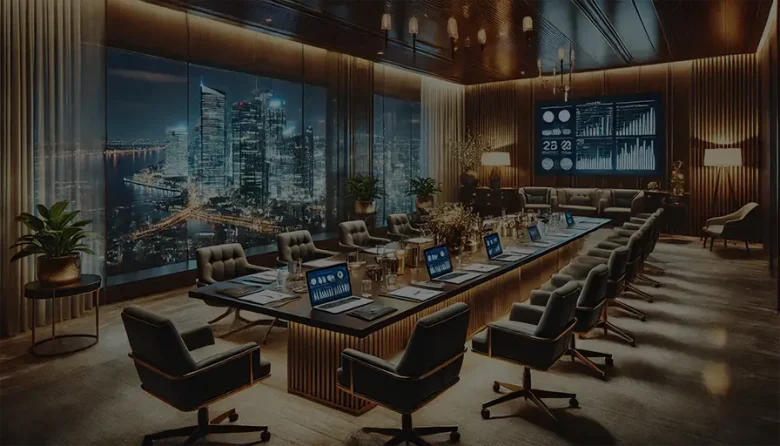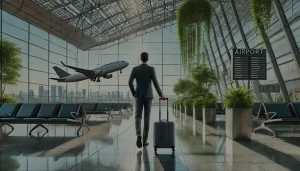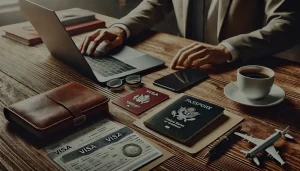Table of Contents
Managing meetings and reservations during business trips to luxury hotels in large cities is a challenge that requires meticulous planning, attention to detail and a deep understanding of both the corporate environment and the high-end hotel sector. In a scenario where image, efficiency and experience are fundamental, mastering this process can be crucial to the success of professional meetings and the consolidation of strategic relationships.
Corporate Travel and Luxury Hotels Overview
The corporate travel landscape has evolved significantly in recent years, especially with the increase in companies investing in unique experiences for their employees and partners. In cities such as São Paulo, New York, London and Tokyo, the number of luxury hotels is constantly growing, offering exclusive services, cutting-edge infrastructure and prime locations. These establishments not only enhance the guest experience, but also help to ensure that corporate events, meetings and gatherings run smoothly.
Trends and Transformations
Luxury hotels today are not just about offering high-end accommodations. They are also investing in coworking spaces, meeting rooms equipped with cutting-edge technology, personalized services and experiences that reflect local culture and identity. This trend reflects the need to provide environments that inspire innovation, promote networking and stimulate creativity.
The growing demand for these services is largely driven by the profile of the modern executive, who seeks not only comfort, but an experience that combines well-being, functionality and exclusivity. Thus, choosing a luxury hotel It goes far beyond the simple act of staying; it is about investing in an environment that enhances professional results.
Real Examples and Success Stories
Global companies have stood out by choosing to hotels that offer corporate programs Customized. Renowned brands such as Marriott and Hilton have developed strategic partnerships that provide access to VIP areas, exclusive meeting rooms and specialized concierge services, ensuring that every detail of the stay contributes to the success of the business. These cases demonstrate that, when well planned, reservations and meetings management can transform a simple business trip into a valuable opportunity to strengthen relationships and close deals.
Preparation and Planning
Preparation is the foundation of any successful corporate trip. Planning every step in advance, from booking your hotel to scheduling meetings, avoids setbacks and maximizes the use of time and resources invested.
Advance Planning
Booking in advance is one of the first steps to ensuring favorable conditions. By booking your stay in advance, you can negotiate better rates, secure upgrades, and have access to exclusive benefits. In addition, booking in advance allows managers to analyze different hotel options and choose the one that best suits the company's needs, taking into account location, infrastructure, and services offered.
A common practice is to use specialized platforms that centralize reservation management and allow viewing of all service details, such as availability of meeting rooms, high-speed internet access, power options and other facilities that a luxury hotel can offer.
Defining Objectives and Goals
Before you even begin the booking process, it’s essential to clearly define your travel objectives. Whether it’s for strategic meetings, training sessions or networking events, each meeting should have specific, measurable goals. This definition not only guides your choice of hotel, but also helps you prepare agendas and organize meetings, ensuring that all parties involved know exactly what they hope to achieve.
Creating a pre-trip checklist is a indispensable tool. This document should include items such as:
- Verification of booking conditions and confirmation of contracted services.
- Review of equipment and technologies available in meeting rooms.
- Prior contact with the hotel team to align operational and logistical details.
- Preparation of support materials and presentations that will be used in the meetings.
Practical Examples in Preparation
Companies that invest in detailed planning usually have teams specialized in corporate travel. These professionals use management software to centralize information, automate scheduling, and ensure that all reservations are integrated with the executives' schedules. For example, an executive from a multinational company may have a calendar synchronized with the hotel's systems, allowing real-time adjustments and immediate communication with those responsible for the service.
Managing Meetings While Traveling
Once the logistics of the trip are organized, the next challenge is to conduct meetings effectively, keeping the focus on objectives and ensuring that the time invested is productive.
Scheduling and Organizing Meetings
Successful meetings start with a well-structured schedule. It is essential to avoid scheduling conflicts and create an agenda that allows for smooth transitions between appointments. To achieve this, many managers use specialized applications that facilitate the scheduling of meetings and the management of appointments, enabling synchronization with personal and corporate calendars.
Creating a clear and objective agenda is another crucial point. Each meeting should have a defined agenda, with topics organized in order of importance and time allocated for each subject. This approach helps keep the meeting focused and ensures that all relevant points are discussed.
Driving Techniques
During the meeting, it is important for the moderator to maintain an appropriate pace and encourage active participation from those present. Some techniques that can be used include:
- Prior distribution of materials and data that will be discussed.
- Establishing rules of engagement, such as a time limit for presentations.
- Using visual aids, such as slides and graphs, to illustrate key points.
- Creating moments for questions and answers, ensuring that all doubts are clarified.
Management of unforeseen events
Even with rigorous planning, unforeseen events can occur. Last-minute cancellations, delays or changes of plans are common situations in corporate travel. To deal with these challenges, it is essential to have a contingency strategy that involves:
- A direct and efficient communication channel with hotel staff and meeting participants.
- Flexibility to adjust schedule as needed.
- Technological resources that allow rapid reprogramming and real-time information sharing.
A practical example is the use of messaging and videoconferencing applications, which make it possible to hold remote meetings or quickly rearrange the schedule if a participant is unable to attend in person. This agility in resolving problems demonstrates professionalism and ensures that the quality of the meeting is not compromised.
Reservations and Logistics in Luxury Hotels
In addition to organizing meetings, managing reservations and logistics at the hotel is a crucial aspect that can directly impact the travelers' experience.
Reservation and Negotiation Process
When choosing a hotel, you should take into account several factors, such as location, available infrastructure and services offered. Negotiating the best conditions is essential to maximize the benefits of your stay. Many luxury hotels offer corporate packages that include:
- Special rates for advance bookings.
- Access to equipped meeting rooms and VIP areas.
- Personalized concierge services that assist in organizing events and resolving specific demands.
A real example can be found in hotel chains that offer loyalty programs for companies, providing progressive discounts and exclusive benefits, such as room upgrades and access to exclusive events. Negotiating these packages can result in a more enriching and cost-effective experience for the company.
Systems Integration and Automation
Integrating booking systems with travel management tools is a practice that has been gaining prominence. This integration allows all information, from the booking date to the details of the services contracted, to be available in a single digital environment. This means that any changes or adjustments can be made quickly and centrally, reducing errors and optimizing processes.
Specialized digital platforms facilitate the management of this information, enabling the automation of tasks such as confirming reservations, scheduling meetings and monitoring the services provided by the hotel. This approach not only improves operational efficiency, but also provides an integrated and up-to-date view of all travel logistics.
Personalization and Exclusive Service
One of the greats differences between luxury hotels is the ability to offer personalized services. From choosing the room to providing specialized assistance during the stay, every detail is designed to meet the specific needs of guests. This personalization can include:
- Concierge services that organize everything from reservations at renowned restaurants to booking exclusive tours around the city.
- Preparation of meeting rooms with specific equipment and arrangements, according to the client's preferences.
- Multilingual service and 24-hour support, ensuring that any request is answered immediately.
In a practical example, a company that organizes a large corporate event You can count on the hotel team to prepare an environment that reflects the brand’s identity, with personalized decoration, high-quality catering services and cutting-edge technology for presentations and videoconferencing. This level of personalization contributes to a memorable experience and strengthens business relationships.
Impact on Corporate Performance
The way business travel is managed can directly influence corporate performance. Operational efficiency, combined with organization and personalized services, is reflected in several aspects of the business.
Increased Productivity
When every detail is planned and executed with precision, executives can focus on what really matters: conducting business and making strategic decisions. Optimizing the agenda, organizing meetings, and ensuring a comfortable and functional environment all contribute to more productive and results-oriented meetings.
For example, a company that invests in integration and automation technologies can reduce the time spent on bureaucracy and unforeseen events, allowing employees to dedicate themselves fully to strategic activities. This operational efficiency can translate into significant productivity gains, positively reflecting the organization's overall performance.
Return on Investment (ROI)
The investment in high standard corporate travel should not be seen as just a cost, but rather as an opportunity to generate value. By providing an environment conducive to holding strategic meetings and creating solid bonds with customers and partners, the return on this investment can be measured in terms of closing new deals, customer loyalty and increased competitiveness in the market.
Case studies show that companies that invest in personalized, high-quality experiences tend to achieve superior results compared to those that adopt conventional approaches. Integrating technological solutions, negotiating advantageous corporate packages and personalizing service are factors that, when well executed, enhance the return on each investment made.
Performance Indicators and Monitoring
To measure the impact of corporate travel, it is essential to define performance indicators (KPIs) that cover both qualitative and quantitative aspects. Some of the KPIs that can be monitored include:
- Attendance and engagement rate at meetings.
- Feedback from participants on the quality of services and infrastructure.
- Efficiency in resolving unforeseen events and executing agendas.
- Growth in business volume and partnerships closed during the trip.
Based on these indicators, companies can adjust their strategies and identify areas for improvement, ensuring that each new corporate trip is even more successful than the last.
Tips and Tools to Enhance the Experience
With the evolution of technology and the growing demand for differentiated experiences, several tools and resources can be used to improve the management of meetings and reservations during corporate travel. Below are some highlights: practical tips and solutions:
Specialized Technologies and Software
Currently, there are a variety of applications and platforms that centralize management of corporate travel. These systems allow calendar integration, booking automation and agenda synchronization, making it easier to monitor each step of the process. Some of the most valued features include:
- Travel management platforms: They allow complete planning, from choosing the hotel to scheduling meetings, with detailed reports that help in decision making.
- Communication applications: Tools such as instant messaging and video conferencing software ensure that communication between executives, hotel staff and partners is fast and efficient.
- Monitoring systems: Solutions that offer dashboards with performance indicators help track ROI and identify areas that need adjustments.
Checklists and Planning Templates
To avoid forgetfulness and ensure that all details are covered, it is a good practice to use checklists. These templates can include everything from checking reservations to confirming food, technology and transportation services. Some of the essential items on a corporate checklist are:
- Confirmation of dates and times of all meetings.
- Checking the equipment available in the meeting rooms.
- Coordination of catering services and coffee breaks.
- Alignment with the hotel team on the specific needs of the group.
Personalization and Relationship with the Hotel
Developing a close relationship with the hotel staff can make all the difference in the guest experience. By communicating the company’s expectations and needs in advance, it is possible to personalize services, from the decoration of the meeting room to the provision of exclusive amenities. In unforeseen situations, this close relationship allows for a quick and efficient response, demonstrating the importance that the company places on the experience of its employees and partners.
Practical Examples and Case Studies
To illustrate the effectiveness of good meetings and reservations management, let’s look at two case studies that demonstrate the benefits of this approach:
Case Study 1: International Expansion
A multinational company planning to expand its business in Latin America decided to hold a series of strategic meetings at a luxury hotel in São Paulo. By using an integrated platform to manage reservations and synchronize meeting times, the company was able to:
- Reduce the time spent on schedule adjustments by 30%.
- Ensure the presence of all executives at meetings, even with last-minute unforeseen events.
- Negotiate corporate packages that include equipped meeting rooms and personalized concierge services, raising the quality of meetings.
The result was an environment conducive to closing new contracts and strengthening relationships with strategic partners, demonstrating that investing in a high-quality experience generates significant returns.
Case Study 2: High Impact Corporate Event
A fast-growing technology startup decided to organize a corporate event in a metropolis European company to launch its new product. The choice of a luxury hotel was motivated by the need to impress investors and potential customers. During the event, the company had:
- An environment prepared with cutting-edge technology, which included meeting rooms with high-resolution videoconferencing.
- A personalized service, which adjusted every detail of the accommodation and meetings according to the demands of the participants.
- The integration of systems that allowed real-time monitoring of the event’s performance indicators.
As a result, the startup recorded a significant increase in attracting investments and generating business opportunities, demonstrating that meticulous and personalized organization can transform an event into a powerful growth tool.
Reflections on the Importance of Integrated Management
Managing meetings and reservations for high-end corporate travel goes beyond organizing schedules and confirming services. It involves creating an environment that enhances the experience of executives, facilitates communication and allows strategic meetings to be held efficiently and with quality. Integrating technologies, personalizing service and establishing solid partnerships with luxury hotels are factors that, together, contribute to the consolidation of a differentiated corporate experience.
By investing in an integrated, results-oriented approach, companies not only optimize their internal processes, but also convey an image of excellence and professionalism to their partners and customers. This perception can be decisive in building lasting relationships and gaining competitive advantages in the market.
Resources and Tools for Everyday Life
To assist in the execution of a management corporate travel In order to effectively manage your business, it is important that professionals have resources that facilitate organization and communication. Some tools that can be incorporated into your daily routine include:
- Integrated Management Platforms: Tools that centralize all travel information, allowing you to view reservations, schedules and performance indicators. Examples include specific travel management software and CRM systems adapted to the hotel sector.
- Instant Communication Applications: Software that enables real-time information exchange between meeting participants and hotel staff. This integration is essential for quickly resolving any unforeseen issues and adjusting plans as needed.
- Dashboards and Reports: Systems that allow continuous monitoring of performance indicators, such as attendance rates, participant satisfaction and return on investment. This data is essential for making future strategic decisions.
Future Perspectives and Innovations in the Sector
The corporate travel sector in luxury hotels is constantly evolving, keeping up with technological transformations and new market demands. Some innovations that are already being implemented and that promise further transform the executive experience include:
- Artificial Intelligence and Big Data: Tools that analyze behavior patterns and offer personalized recommendations for optimize reservations, suggest adjustments to the agenda and predict unforeseen events based on historical data.
- Virtual and Augmented Reality: Technologies that allow for previewing meeting environments and hotel spaces, facilitating the choice and personalization of the meeting place.
- Process Automation: Systems that automate booking confirmation, schedule updates and communication between the different sectors involved in organizing the trip, reducing the risk of human error and increasing operational efficiency.
These innovations, combined with the expertise of the professionals involved, are redefining the standards of quality and excellence in the sector, transforming each corporate travel in an experience unique and strategic.
FAQ Session
What are the main challenges when managing meetings on corporate travel?
Common challenges include coordinating schedules across time zones, ensuring that all technology resources are working properly, and managing unexpected events such as last-minute cancellations or changes. The key to overcoming these obstacles is planning ahead and leveraging real-time communication tools.
How to choose the ideal hotel for business trips in big cities?
The choice must take into account the location, the infrastructure offered, the support services and the flexibility of the hotel in meeting corporate demands. Hotels offering corporate packages and personalized services, such as equipped meeting rooms and specialized concierge, are usually the best options.
What technologies can help with meeting and reservation management?
Integrated management platforms, instant messaging applications and indicator monitoring systems are essential tools. These technologies allow you to automate processes, centralize information and facilitate communication between everyone involved in the trip.
How to deal with unexpected events while traveling?
Maintaining a direct and efficient communication channel with the hotel team and using applications that allow for quick adjustments to the schedule are effective strategies. Having a contingency plan and relying on technological support also helps to minimize the impact of unforeseen events.
What benefits can detailed planning bring to corporate travel?
Well-executed planning ensures that meetings are productive, that the services contracted meet expectations and that the experience of executives is improved. This results in greater efficiency, better business relationships and, consequently, a positive return on investment.
In-depth understanding of each stage of the process and the integration of innovative solutions are essential to transform the corporate experience into a strategic tool. By implementing these practices, companies can not only optimize their resources, but also create an environment that favors innovation and sustainable growth.
Managing meetings and reservations with excellence during business trips to luxury hotels is therefore an indispensable skill for the modern executive. It is the combination of detailed planning, the use of cutting-edge technologies and a commitment to personalization that allows us to transform challenges into opportunities and ordinary experiences into moments of excellence. By applying these concepts and strategies, organizations will be better equipped to face the challenges of today's market and to build lasting and beneficial relationships with their partners and customers.
Every detail counts in the pursuit of excellence, and investing in the meticulous organization of each stage of the corporate trip can be the difference that drives business success, promoting an environment where innovation, productivity and efficiency go hand in hand.
With this approach, executives have the opportunity to not only hold meetings, but to transform each encounter into a strategic experience, where service integration and personalization become true allies in building a promising future for their companies.
Final Considerations
When you understand the complexity and importance of managing meetings and reservations during business trips to luxury hotels, it becomes clear that success depends on detailed planning, integrated execution and personalized service. Every step, from choosing the hotel to conducting the meetings, must be carefully planned to ensure that objectives are met and that the executives’ experience is not only productive, but also memorable.
Taking a meticulous, results-oriented approach not only optimizes time and resources invested, but also strengthens business relationships and elevates the company's image among partners and investors. When every detail is carefully managed, the corporate environment becomes a true ally in the search for innovations, strategic partnerships and growth opportunities.
This integrated and strategic vision is what differentiates a common experience of a high-level corporate journey impact. Whether through the use of advanced technologies, the establishment of solid partnerships with luxury hotels or the personalization of the services offered, each action must be aimed at creating an environment where excellence is the rule and results are the natural consequence.
In an increasingly dynamic and competitive world, investing in processes that enhance the corporate traveler's experience is a differentiator that can determine the success of strategies and the consolidation of businesses. high level.

Cosmopolitan executive, business travel consultant and luxury hotel lover, Alexander Belmont shares exclusive insights into premium experiences in metropolises around the world.




